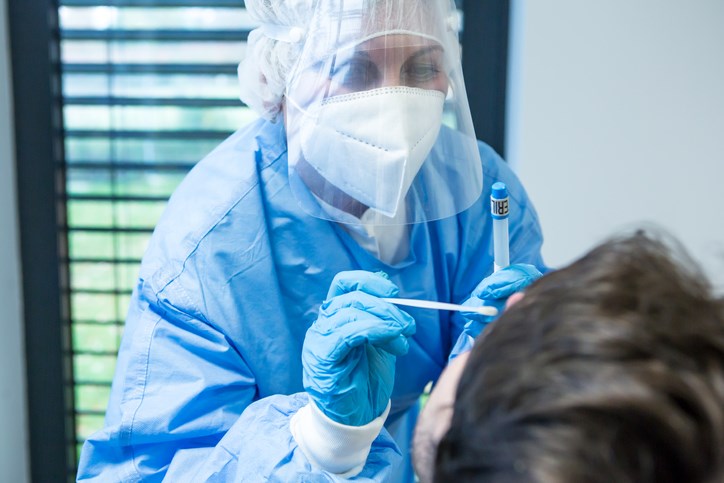Ottawa needs to listen to its scientists and remove expensive COVID-19 testing for incoming, fully vaccinated travellers, Vancouver hotel business and tourism officials said Nov. 10.
"Business travel from the U.S., Asia and around the world has pretty much come to a complete halt, and that is hurting our cities, especially Vancouver's downtown core," Greater Vancouver Board of Trade (GVBT) president Bridgitte Anderson said. "We want to welcome the world again."
To enter Canada, travellers must provide proof of a negative molecular test; among the ones recognized by the Canadian government are PCR tests, which can cost up to $200 per person and potentially thousands for families. And, that's before they meet the requirements of their home countries.
All of that has significantly harmed businesses and jobs, said the Canadian Travel and Tourism Roundtable Wednesday at the Fairmont Pacific Rim in Vancouver. The roundtable consists of the GVBT, the BC Hotel Association, Vancouver-based travel agencies and Destination Vancouver.
Anderson said Ottawa’s rules run counter to the recommendations made by the federal COVID-19 Testing and Screening Expert Advisory Panel.
On May 28, the panel recommended that travellers with proof of vaccination acceptable to Canada should not require a pre-departure test, quarantine requirement or day-seven test after arrival.
However, the panel also said pre-departure and arrival testing reduces the likelihood of bringing COVID-19 into the country (and spreading it), and that both types of testing are more effective when used together.
“Pre-departure testing can reduce the number of actively infectious individuals who arrive in Canada, and the risk of transmission is further reduced when testing is done close to departure time (24 to 48 hours before),” the report said. “From a logistics perspective, pre-departure testing is also less likely to result in delays at the border.”
Pre-arrival molecular test a 'critical part' in monitoring COVID-19
Health Canada spokesperson Anne Génier said Ottawa continues to evaluate the public health, economic and social impacts of border measures, in collaboration with provincial, and territorial and international partners, including industry stakeholders.
“As more evidence becomes available, and as the epidemiological situation improves, the Government of Canada will make appropriate and cautious adjustments to public health measures, with the first and foremost priority being the health and safety of Canadians,” Génier said in a statement.
She said the testing measures are a "critical part of Canada’s COVID-19 surveillance strategy."
"[They] help detect variants of concern and vaccine-escape variants,” Génier said. “Although cases are rare, even fully vaccinated individuals can still become infected with the virus that causes COVID-19. Molecular tests have a significantly high sensitivity for the detection of early-stage cases of COVID-19.”
And that, Génier said, is why the pre-arrival molecular test is required: to reduce the importation of cases, the risks of transmission in transit, and risks to Canada’s domestic health-care system.
Génier said ongoing border testing surveillance program continues to provide the opportunity to conduct genetic sequencing of the virus and its variants.
COVID-19 pre-arrival testing could harm economy
Vancouver welcomed more than 11 million overnight visitors in 2019, according to the roundtable, contributing $14 billion in total revenues to the Metro Vancouver economy and supporting over 104,000 full-time jobs.
Then, COVID hit, with 2020 revenues falling by 70%.
BC Hotel Association director Mike Macleod said the cumbersome requirements are leading international travellers to do business elsewhere.
"Canadian businesses are being disadvantaged compared to their American and European peers," he said.
What’s more, he said, large events such as conferences do bookings years in advance. He said the testing requirements could halt that planning with effects that could harm Vancouver’s economy for years to come.
What’s more, the roundtable said, Canada’s travel rules are out of step with countries such as the U.S., France, Portugal, Germany and the United Kingdom, which have ended incoming pre-departure test requirements for vaccinated travellers.
A survey of countries shows the U.K. no longer requires such testing. Meanwhile, if you're entering the U.S. by air, you're required to provide a negative COVID-19 result (the United States accepts the less-pricier rapid antigen test).
Portugal, as of Nov. 1, requires a PCR test 72 hours before boarding, or a rapid antigen test 48 hours before boarding.
The test has been waived for fully vaccinated travellers entering Germany.
The roundtable also welcomed the possibility of using cheaper antigen testing as a way to remove barriers to visitors coming to Canada.
The federal government did not immediately respond to a request for comment.



